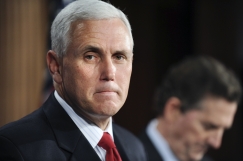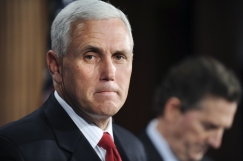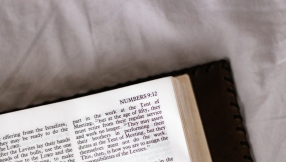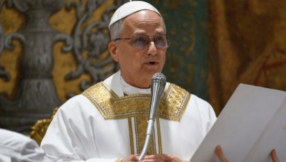
Thousands of people marched in Indiana's largest city on Saturday to protest a state law that supporters contend promotes religious freedom but detractors see as a covert move to support discrimination against gay people.
Waving signs reading "No hate in our state" and carrying rainbow flags, a crowd of at least 2,000 people including Democratic elected officials rallied the same day that business-rating website Angie's List Inc put on hold its plans to expand its Indianapolis operation with new offices, citing the new law.
The Religious Freedom Restoration Act was passed overwhelmingly by the Republican led-state legislature and signed into law on Thursday by Indiana Governor Mike Pence.

Supporters say the legislation will keep the government from forcing business owners to act against strongly held religious beliefs. Opponents say it is discriminatory against gay, lesbian, bisexual and transgender people and broader than other states' religious freedom laws.
"This bill is not about discrimination and does not in any way legalize discrimination in Indiana," said Pence's spokeswoman, Kara Brooks.
That statement did little to assuage the concerns of Rick Sutton, one of the marchers.
"It's a great sound bite but it's not the truth. I'm not protected. LGBT citizens are not protected," Sutton said. "If we were protected, we would not be there right now."
Indiana's also drew criticism from business leaders.
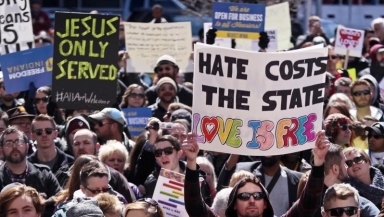
"Angie's List is open to all and discriminates against none and we are hugely disappointed in what this bill represents," company chief executive Bill Oesterle said.
Seattle's openly gay mayor, Ed Murray, said on Saturday he will ban city employees from traveling toIndiana on official business.
"None of our taxpayer dollars should go toward supporting this discriminatory law," Murray said.
The National Basketball Association and Women's National Basketball Association said in a joint statement the basketball leagues would ensure all fans, players and employees feel welcome at events in Indiana and elsewhere.
"The game of basketball is grounded in long established principles of inclusion and mutual respect," they said.
On Friday, Apple Inc's Tim Cook, one of the most prominent openly gay American CEOs, joined other executives, including Salesforce.com Inc's Marc Benioff, in blasting the law.
A day after Indiana's move, the Arkansas Senate overwhelmingly approved a similar bill, which Governor Asa Hutchinson, a Republican, has said he would sign into law.
Wal-Mart Stores Inc, which has its home office in Bentonville, Arkansas, criticized that measure.










